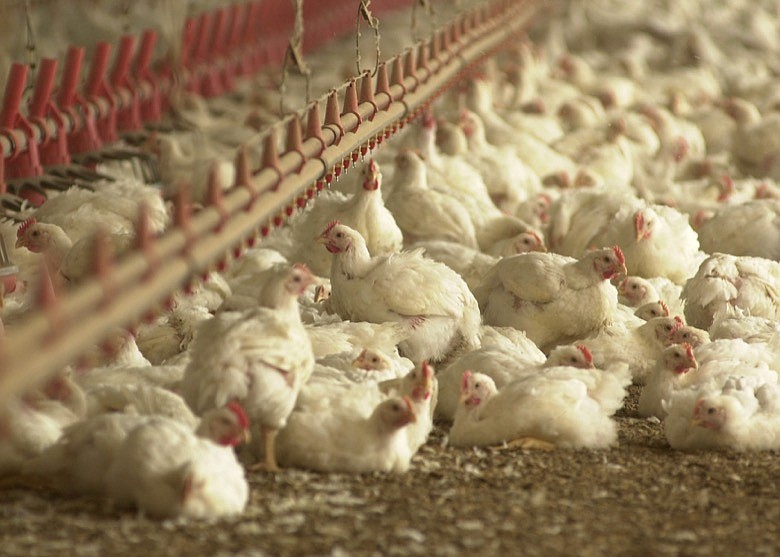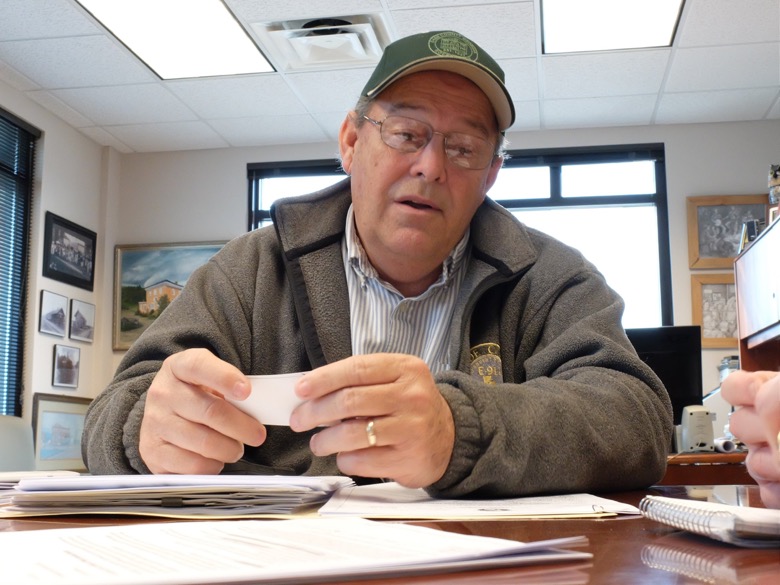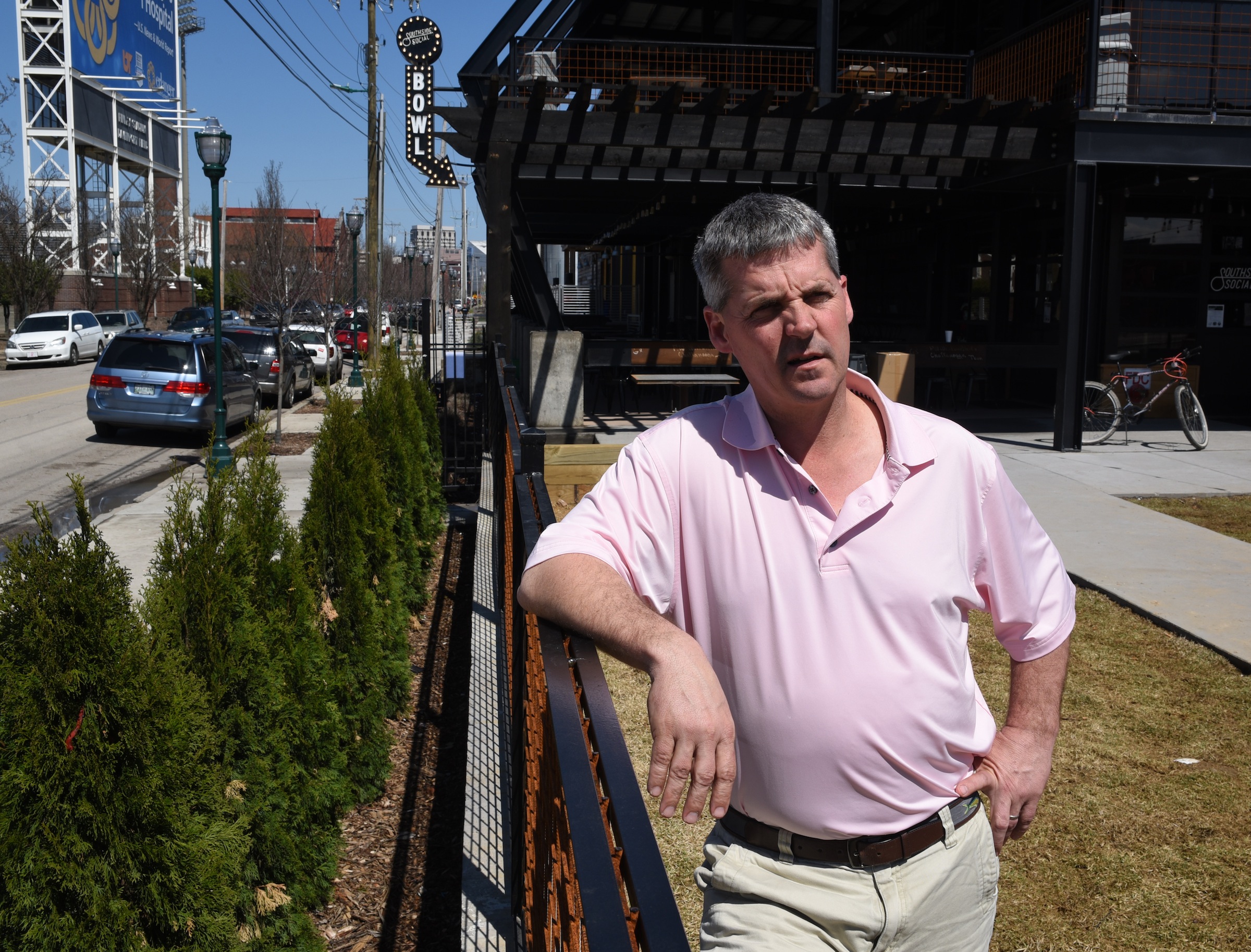Months after news of a possible chicken processing plant relocating to Northwest Georgia began to circulate, the Dade County Commission is taking the final steps in developing an ordinance that would require a special-use permit for industrial development and could put tighter restrictions on future development of any kind.
Commissioner Phillip Hartline took issue with one late addition to the ordinance that would prohibit any poultry operation - whether it be for housing, raising, producing, processing or selling - within 500 feet from all property boundary lines or streams in the county.
"The purpose of this ordinance is industry, not chicken houses" Hartline said.
 Dade County Commission District 2 candidate Phillip Hartline answers questions during a debate at Dade County Public Library on Thursday, April 19, 2018, in Trenton, Ga. Multiple candidates across several races were in attendance for the forum, which precedes the May 22 primary election. / Staff photo by Doug Strickland
Dade County Commission District 2 candidate Phillip Hartline answers questions during a debate at Dade County Public Library on Thursday, April 19, 2018, in Trenton, Ga. Multiple candidates across several races were in attendance for the forum, which precedes the May 22 primary election. / Staff photo by Doug StricklandHartline believes the ordinance as written goes too far and will infringe on people's property rights. The reason the commission is putting a heavy industrial use ordinance on the books in the first place is to keep unwanted industries out of Dade County and to also give the county rules and procedures that people have to follow.
The 500-foot setback for a chicken house is an agricultural issue, Hartline said, not an industrial one.
The setback came from a recommendation from researchers at the University of Georgia. A committee in charge of drafting the ordinance used the university's research to write the draft.
Commissioner Robert Goff said the setback rule would not affect anyone in Dade County now. Hartline said he's not worried about who is in Dade County now but who might be in Dade County in the future.
"This is my future," he said. "Y'all are going to get me very heated on this, because this is not just about people that are here now. It's about people in the future. We don't have industry just beating down our door. You're talking about a $28 million industry in Dade County that you're attacking."
"This didn't start about heavy industry, this started about chickens," Hartline said.
Commissioners Ted Rumley and Lamar Lowery pushed back on that, saying that a heavy industrial chicken processing plant started it, but the ordinance will offer protection from a lot more than just a processing plant.
Another hang up some commissioners had was how the ordinance tries to define a slaughterhouse. In the most recent draft, the special-use permit would not be required for an operation that kills animals on site one day a week.
It also would exempt businesses serviced by fewer than two semitractor-trailers per week.
The exact stipulations confused several of the commissioners. Robin Rogers, attorney for Dade County, said the language was put in place to try to define an industrial operation. The thinking is that if multiple semitrailers or large trucks are using county roads for a business, that would fall under a heavy industry operation, he said.
The new ordinance would also require a business that is expanding by at least 25% to apply for the special-use permit.
County commissioners went back and forth for nearly two hours at this week's work session, knowing that residents will speak out against several of the line items in the new ordinance during a public hearing Jan. 30, Rumley said.
Several Dade County residents at an October meeting spoke out against zoning ordinances, saying they infringe on their property rights and would put restrictions on what they can or cannot do on their own land.
Others were in favor of some sort of zoning, but finding that middle ground has been the key to the commission and community's next steps.
The draft ordinance would require applicants who want to develop or substantially expand a number of industrial sites, businesses, plants, warehouses and other facilities to obtain a special-use permit.
In the draft, the commission wrote that while industry could have positive economic benefits for the county, development has the "potential to have substantial negative impacts to the community, public road and utility infrastructure, environment (and) property values."
How we got here
In August, the commission placed a moratorium on permit applications for development after residents were told that real estate developer John Wise was considering helping facilitate the move of Pilgrim's Pride from downtown Chattanooga to a 300-acre farm he purchased earlier last year in Dade County.
Wise told the Times Free Press in August he had no plans to develop anything on the property, adding that he wants to keep it as a "gentleman's farm" and host quail hunts.
However, with speculation brewing in the community, the commission felt the need to act, seeing as Dade County is only one of a handful of 159 counties in Georgia that has no zoning ordinances at all.
The Dade County Commission, with a push from the public, passed a resolution that put a moratorium on permit applications, but not without some insight from Wise.
Lowery said some of the commissioners met with Wise before the resolution was passed and discussed how to create regulations for industries in unincorporated parts of the county.
Lowery also said Wise assured the commissioners that "for right now, he had no plans to build a chicken processing plant" in Dade County, but he didn't go as far as saying he wouldn't build the plant.
The moratorium for industrial development is in effect until February. The commission is trying to get a definitive ordinance on the books that will put residents at ease while also not restricting their property rights.
What happens next
The Jan. 30 public hearing is scheduled for 6 p.m. at the Dade County Administrative Building in Trenton.
The commission hopes to have the ordinance on the books early this year, so the final changes could be made soon after the public gets to voice their thoughts and concerns.
Contact Patrick Filbin at pfilbin@timesfreepress.com or 423-757-6476. Follow him on Twitter @PatrickFilbin.



